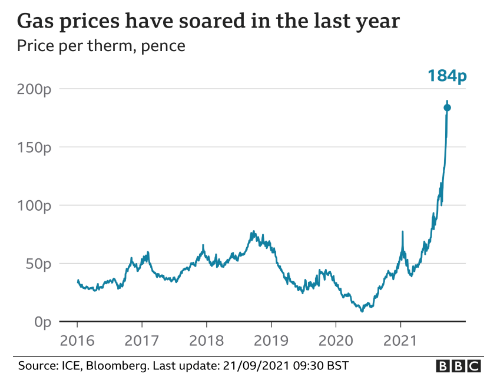Britain’s energy crisis explained
- Chiara Haegelsteen
- Oct 4, 2021
- 3 min read
Over the past year, energy suppliers in the United Kingdom have gone bankrupt, at a menacing rate; since the beginning of 2021, 7 energy supply companies, such as utility point, moneyplus and hub energy have been forced to come to an end, which has affected more than a million households that were depending on them. But in fact, this is just the tip of the iceberg, as many others of these producers are increasingly making demands for the government to receive a bailout. For instance, the UK's sixth's largest company, Bulb, has also been reported by the Financial Times to be making these demands. With over 1.7 million customers, this corporation is already collaborating with investment bank Lazard to consolidate its finances. Without the necessary funds, at least 4 other companies are expected to go bust in the upcoming week, or even, days. To give you a sense of the severity of the problem: at the start of 2021, there were 70 active suppliers in the UK, a number that is expected to drop down to about 10 by this December.

Causes :
So what are the sources of this severe economic crisis ? Well, the problem can be narrowed down to two main causes: United Kingdom´s shortage of energy supplies, and its price cap. The origin of UK's shortage of energy is that its production is heavily reliant on wind and natural gas, wind providing more than 25 percent of UK´s total energy, and natural gas about 32 percent. In 2020, both these energy sources combined constituted about 60 percent of all energy generation, which is double as much as the European average (about 30 percent). The unfortunate situation is that both of these resources have been lacking for the past year, wind in a national level for UK, and natural gas globally, particularly in Europe, mainly because of the cold winter in Russia and Norway, the two main producers for Europe's natural gas, and the problems of gas flow from Russia to Europe. These events have forced Europe to get this precious resource from the international gas market, but unluckily, high demands in Asian countries made international gas prices increase, and with them the UK gas prices, which rose by about 200 percent in the past six months. The side impacts of gas prices have caused businesses to close, commercial bottled CO2 to be limited, and serious threats to the meat and fresh food supplies.
Since the UK cannot really rely on coal-powered or nuclear energy, wholesale electricity prices in the UK, which is what energy suppliers pay for their electricity before selling it to the consumer, rose by about 700 percent compared to the average for the last 10 years. But why are electricity companies going bankrupt? Well, this is due to UK's energy price cap, which basically is what prevents energy suppliers from imposing unreasonable prices on their customers and guarantee price stability. It is set by an independent organisation named the office of gas and electricity markets, also known as Ofgem. Even if the price cap is being risen due to this crisis, many energy supplying corporations still calm it is too low for them to make a profit since wholesales energy prices are so high.
Possible solutions :
The government’s possible solutions to stop this situation are to either to remove the energy price cap, which will expose customers to the higher prices, or grant a bailout to energy suppliers in need with taxpayer money.
The UK's business secretary has announced that he will not take off the price cap and has offered to consider some loans to support energy companies, but the decision hasn't been made final at this moment. Another possible solution is the famous three-day week, same as what happened in 1974, under the instructions of Edward Heath, where work was only mandatory 3 days a week, reducing considerably the use of energy. But despite all possibilities, gas prices are expected to stay this high for at least another 4 months, as there is no good solution at the time. Meaning this ongoing situation is presumably not about to end.
Works cited :
BBC News. “Failing Energy Firms May Mean Higher Bills, Warns Regulator.” BBC News, BBC News, 21 Sept. 2021, www.bbc.com/news/business-58634106. Accessed 1 Oct. 2021.
jaymi-mccann. “The Energy Companies That Have Gone Bust in the UK Gas Crisis as Avro and Green Collapse.” Inews.co.uk, 22 Sept. 2021, inews.co.uk/news/uk/energy-companies-bust-which-gone-firms-at-risk-gas-crisis-shortage-avro-green-collapse-1212788. Accessed 1 Oct. 2021.
Davies, Rob. “Surge in UK Wholesale Gas Prices Fuels Winter Energy Crisis Fears.” The Guardian, The Guardian, 28 Sept. 2021, www.theguardian.com/business/2021/sep/28/uk-wholesale-gas-prices-highs-winter-energy-crisis-suppliers. Accessed 1 Oct. 2021.
Taylor, Chloe. “British Energy Firms Fear Collapse as Europe’s Gas Crisis Sees Prices Surge 250%.” CNBC, CNBC, 20 Sept. 2021, www.cnbc.com/2021/09/20/british-energy-firms-fear-collapse-as-european-gas-prices-surge-250percent.html. Accessed 1 Oct. 2021.





Comments